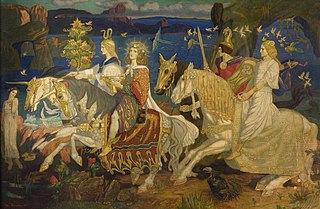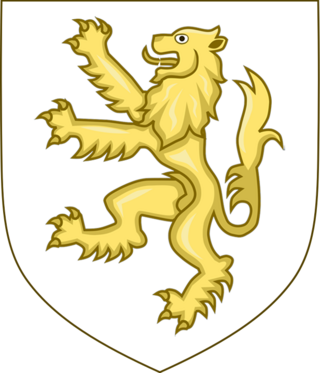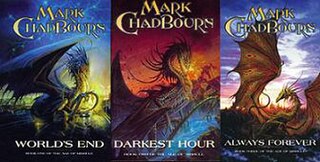
Lugh or Lug is a figure in Irish mythology. A member of the Tuatha Dé Danann, a group of supernatural beings, Lugh is portrayed as a warrior, a king, a master craftsman and a saviour. He is associated with skill and mastery in multiple disciplines, including the arts. Lugh also has associations with oaths, truth and the law, and therefore with rightful kingship. Lugh is linked with the harvest festival of Lughnasadh, which bears his name. His most common epithets are Lámfada and Samildánach. This has sometimes been anglicised as "Lew of the Long Hand".

The TuathaDé Danann, also known by the earlier name Tuath Dé, are a supernatural race in Irish mythology. Many of them are thought to represent deities of pre-Christian Gaelic Ireland.

In Irish mythology, Nuada or Nuadu, known by the epithet Airgetlám, was the first king of the Tuatha Dé Danann. He is also called Nechtan, Nuadu Necht and Elcmar, and is the husband of Boann. He is mostly known from the tale in which he loses his arm or hand in battle, and thus his kingship, but regains it after being magically healed by Dian Cécht. Nuada is thought to have been a god and is related to the British and Gaulish god Nodens, who is associated with hunting and fishing. His Welsh equivalent is Nudd or Lludd Llaw Eraint.
In Irish mythology, Fódla or Fótla, daughter of Delbáeth and Ernmas of the Tuatha Dé Danann, was one of the tutelary goddesses of Ireland. Her husband was Mac Cecht.
In Irish mythology, Bodb Derg or Bodhbh Dearg was a son of Eochaid Garb or the Dagda, and the Dagda's successor as King of the Tuatha Dé Danann.
In Irish mythology, Bres was a king of the Tuatha Dé Danann. He is often referred to by the name Eochaid / Eochu Bres. He was an unpopular king, and favoured his Fomorian kin.
In Irish mythology, Elatha, Elotha, Elier or Elada was a king of the Fomorians and the father of Bres by Ériu of the Tuatha Dé Danann, as well as Delbaeth, Ogma, Elloth, and the Dagda by an unnamed mother. The imagery surrounding him suggests he may be associated with sources of light and illumination, such as the sun.

The Fomorians or Fomori are a supernatural race in Irish mythology, who are often portrayed as hostile and monstrous beings. Originally they were said to come from under the sea or the earth. Later, they were portrayed as sea raiders and giants. They are enemies of Ireland's first settlers and opponents of the Tuatha Dé Danann, the other supernatural race in Irish mythology; although some members of the two races have offspring. The Tuath Dé defeat the Fomorians in the Battle of Mag Tuired. This has been likened to other Indo-European myths of a war between gods, such as the Æsir and Vanir in Norse mythology and the Olympians and Titans in Greek mythology.
In the Mythological Cycle of early Irish literature, Midir, Midhir or Mider was a son of the Dagda of the Tuatha Dé Danann. After the Tuatha Dé were defeated by the Milesians, he lived in the sidh of Brí Léith. The name Midir may come from the old Irish word for a judge, midithir.
Finvarra, also called Finvara, Finn Bheara, Finbeara or Fionnbharr, is the king of the Daoine Sidhe of western Ireland in Irish folklore. In some legends, he is also the ruler of the dead. Finvarra is a benevolent figure, associated with horses, who ensures good harvests and rewards mortals with riches.

Cath Maige Tuired is the name of two saga texts of the Mythological Cycle of Irish mythology. It refers to two separate battles in Connacht: the first in the territory of Conmhaícne Cúile Tuireadh near Cong, County Mayo, the second near Lough Arrow in County Sligo. The two texts tell of battles fought by the Tuatha Dé Danann, the first against the Fir Bolg, and the second against the Fomorians.

The Children of Lir is a legend from Irish mythology. It is a tale from the post-Christianisation period that mixes magical elements such as druidic wands and spells with a Christian message of Christian faith bringing freedom from suffering.
In Irish mythology Eochaid, son of Erc, son of Rinnal, of the Fir Bolg became High King of Ireland when he overthrew Fodbgen. He was the first king to establish a system of justice in Ireland. No rain fell during his reign, only dew, and there was a harvest every year.

Éber Finn, son of Míl Espáine, was, according to medieval Irish legend and historical tradition, a High King of Ireland and one of the founders of the Milesian lineage, to which medieval genealogists traced all the important Gaelic royal lines.

Érimón, commonly Anglicised as Heremon, son of Míl Espáine, according to medieval Irish legends and historical traditions, was one of the chieftains who took part in the Milesian invasion of Ireland, which conquered the island from the Tuatha Dé Danann, and one of the first Milesian High Kings.

In Celtic mythology, the Otherworld is the realm of the deities and possibly also the dead. In Gaelic and Brittonic myth it is usually a supernatural realm of everlasting youth, beauty, health, abundance and joy. It is described either as a parallel world that exists alongside our own, or as a heavenly land beyond the sea or under the earth. The Otherworld is usually elusive, but various mythical heroes visit it either through chance or after being invited by one of its residents. They often reach it by entering ancient burial mounds or caves, or by going under water or across the western sea. Sometimes, they suddenly find themselves in the Otherworld with the appearance of a magic mist, supernatural beings or unusual animals. An otherworldly woman may invite the hero into the Otherworld by offering an apple or a silver apple branch, or a ball of thread to follow as it unwinds.

The Age of Misrule is a three-book modern fantasy novel series, written by Mark Chadbourn. It is set in Britain and the faery Otherworld around the beginning of the third millennium.

Bard: The Odyssey of the Irish is a 1984 historical fantasy novel by Morgan Llywelyn. It depicts the migration of Galicians to Ireland, led by Amergin the bard and the Sons of the Mil. It is loosely based on the Early Irish Lebor Gabála Érenn or The Book of Invasions found in several medieval manuscripts.
Amergin Glúingel or Glúnmar is a bard and judge for the Milesians in the Irish Mythological Cycle. He was appointed Chief Ollam of Ireland by his two brothers, the kings of Ireland. A number of poems attributed to Amergin are part of the Milesian mythology.











